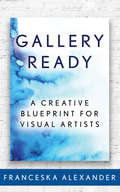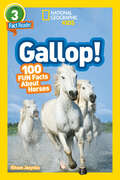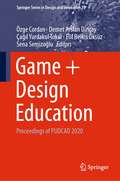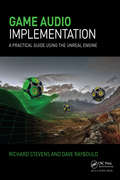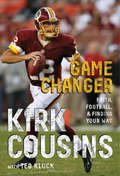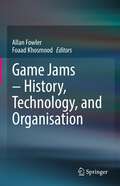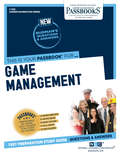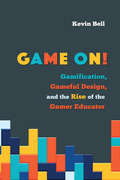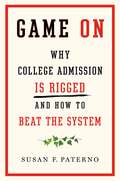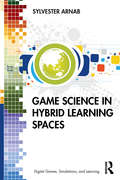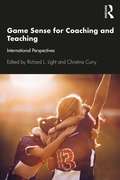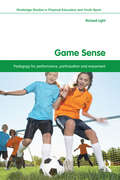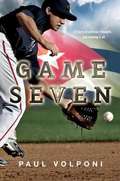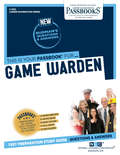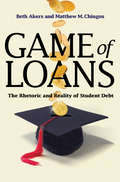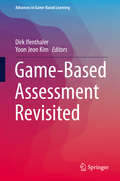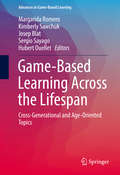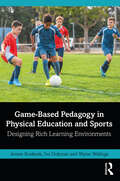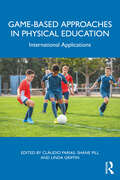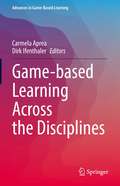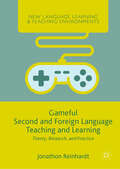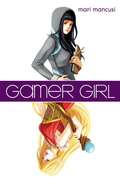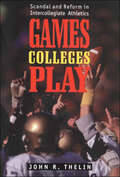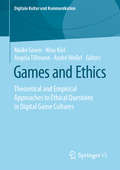- Table View
- List View
Gallaudet: Friend of the Deaf
by Etta DegeringOn a May day in 1814, while watching his younger brothers and sisters at play, Thomas noticed a small girl taking no part. She was Alice Cogswell, and deafness shut her out of the circle. The lack of language created a barrier between her and her friends. Thomas invented a game that helped Alice for the first time in her life to understand that things have names. Thomas knew what he could do. He knew he had to bring education for the deaf to America!
Gallery Ready: A Creative Blueprint for Visual Artists
by Franceska AlexanderDo you desire to show your art in a gallery, yet do not know where to begin?Gallery Ready shares best practices for visual artists, from emerging to midcareer, so they can experience optimum results in making, showing and selling their art. As an artist, you will learn what you can do to attract the attention of a gallery director.Gallery Owner, Franceska Alexander shows artists:How to make their art stand out from the crowdHow to be fully prepared to meet with a important gallery decision makersHow to keep their artwork fresh and collectors excited about the art Gallery Ready, A Creative Blueprint for Visual Artists, clearly illustrates what artists can do to make their art, gallery ready!
Gallop! (Readers)
by Kitson JaznykaCalling all pony lovers, horse fanatics, and bookworms! Trot through 100 enchanting equine facts in this new leveled reader, perfect for fluent readers.Packed with weird-but-true facts and tons of equestrian animal info, this Level 3 Reader gallops right into the world of horses--from wild ponies to superstar racers to the shared history of humans and horses. National Geographic Fact Readers feature the same expert-vetted running text as traditional readers--with a bonus of 100 fun facts spread throughout the book! A fact roundup at the end of each book lets kids review what they've learned. (Plus, they can impress their friends with their stallion smarts!)
Game + Design Education: Proceedings of PUDCAD 2020 (Springer Series in Design and Innovation #13)
by Özge Cordan Demet Arslan Dinçay Çağıl Yurdakul Toker Elif Belkıs Öksüz Sena SemizoğluThis book gathers the papers of the PUDCAD Universal Design Practice Conference: Game + Design Education, organized by Istanbul Technical University and held online on June 24-26, 2020. The conference represented one of the key events of the Practicing Universal Design Principles in Design Education through a CAD-Based Game (PUDCAD) project, which developed a design game on a CAD-based platform, enabling students and designers to learn about universal design principles and develop accessible and innovative design ideas. As such, the PUDCAD project met one of the foremost goals of the European Commission, making sure the inclusion and efficient accessibility for people with disabilities into everyday life. The main topics of the conference include: universal design and education, universal design and user experience, game and design studies, gamification, virtual reality experiment, e-learning in design, and playful spaces and interfaces. The contributions, which were selected by means of a rigorous international peer-review process, highlight numerous exciting ideas that will spur novel research directions and foster multidisciplinary collaboration among different specialists.
Game Audio Implementation: A Practical Guide Using the Unreal Engine
by Richard Stevens Dave RaybouldGame Audio Implementation offers a unique practical approach to learning all about game audio. If you've always wanted to hear your sound or music in a real game then this is the book for you. Each chapter is accompanied by its own game level where you can see the techniques and theories in action before working through over 70 exercises to develop your own demo level. Taking you all the way from first principles to complex interactive systems in the industry standard Unreal Engine© you’ll gain the skills to implement your sound and music along with a deep transferable knowledge of the principles you can apply across a range of other game development tools. <P><P> The accompanying website (www.gameaudioimplementation.com) includes: <P><P> <P><P>12 downloadable demonstration games <P><P>A unique exercise level for you to develop for your portfolio <P><P>An up-to-date online bibliography with further reading for each chapter <P><P>A free sound library with hundreds of game SFX
Game Changer
by Kirk Cousins“This game means a lot to me, and by the grace of God, I’ll never lose sight of the privilege it is to play it.”—Kirk Cousins Kirk’s book is a reflection of who he is—not just a football player, but someone who is committed to making those around him better in every walk of life. —Mike Shanahan, head coach, Washington Redskins In 2011, the NFF selected 16 college football players as "National Scholar Athletes", one of the highest honors a college football player can receive … Kirk was one of these distinguished 16, which says everything you need to know about him. —Archie Manning, chairman, National Football Foundation and College Hall of Fame Kirk Cousins is a lot more than an outstanding quarterback. He walks the talk. Few people I've met can inspire like he does. —Jon Gruden, ESPN announcer and former head coach, Tampa Bay Buccaneers In a world with far too many bad examples, Kirk is a bright light of hope, inspiration, and leadership for a new generation. —Bill Huizenga, United States Congressman, Michigan What’s it really like for a person of strong character to live in the spotlight of pressure and fame? Sit down with Kirk Cousins, record-setting Michigan State quarterback and 2012 draft pick of the NFL’s Washington Redskins. In Game Changer, Cousins gives readers an inside look at his life—as experienced under the bright lights ofcollege and professional football—and how he put his faith and values into action, both on and off the field. Featuring: Personal stories and struggles of a competitive Christian athlete Truthful discussion of media hype and modern sports culture Reflections on honesty, humility, hard work, privilege, and responsibility Life principles for winning choices on and off the field
Game Jams – History, Technology, and Organisation
by Allan Fowler Foaad KhosmoodThis book will provide a comprehensive guide to creating and managing a game jam. The book will also provide an overview of how and where game jams have been held, the type of game jams, the tools and technologies used in organising and participating in game jams.
Game Management: Passbooks Study Guide (Career Examination Series)
by National Learning CorporationThe Game Management Passbook® prepares you for your test by allowing you to take practice exams in the subjects you need to study. It provides hundreds of questions and answers in the areas that will likely be covered on your upcoming exam.
Game On!: Gamification, Gameful Design, and the Rise of the Gamer Educator (Tech.edu: A Hopkins Series on Education and Technology)
by Kevin BellHelping teachers take advantage of game design principles and intrinsic motivators to build more effective courses.The changing student body in American higher education demands a new approach to teaching, one that moves toward inclusive, hyperpersonalized learning environments that have much in common with games and social media. Kevin Bell’s Game On! presents dynamic case studies of gamer educators and game-derived techniques to help instructors creatively formulate their own teaching strategies. Breaking gamefully designed classes into their component parts, Bell analyzes what these classes are actually doing and explains why they work. He offers faculty a rubric to assess their own courses for their propensity to engage students, particularly those from low socioeconomic and high-risk populations. Bell explores how game design, pedagogy, and intrinsic motivators can level the playing field to produce rigorous learning environments that are as addictive to all participants as the latest apps and social media systems. He also discusses best practices, lays out the broader context of computer-mediated teaching and learning, and considers the challenges and opportunities that gamification presents.Instructors would do well to consider the key tenets of successful games if they are to engage and graduate the coming generations of learners. Bell’s careful analysis of the theories behind gamification, cognitive science, and instructional design will help them to do just that.
Game On: Why College Admission Is Rigged and How to Beat the System
by Susan F. PaternoDirector of the Chapman journalism program—and mother of four recent college grads—Susan F. Paterno leads you through the admissions process to help you and your family make the best decision possible.How is it possible that Harvard is more affordable for most American families than their local state university? Or that up to half of eligible students receive no financial aid? Or that public universities are rejecting homegrown middle- and working-class applicants and instead enrolling wealthy out-of- state students? College admission has escalated into a high-stakes game of emotional and financial survival. How is the deck stacked against you? And what can you do about it?Susan F. Paterno, a veteran academic and journalist, answers these questions and more in Game On. Paterno helped her four very different kids navigate the application process to a wide range of colleges, paying for their four-year educations on a finite budget. She incisively decodes the college admission industry—the consultants, the tutors, the rankers, the branding companies hawking “advantage”—and arms you with the knowledge you need to make the system work for you.You’ll learn how to narrow your focus, analyze who gets in and why, and look for the right financial fit before considering anything else, including geography, reputation, and, especially, ranking.Among the tools and insights in Game On:· Why forty years of failed free-market policies have led to skyrocketing tuition and historic levels of student debt· Why applying to college has become a bewildering maze and how to find your way to a successful result· Why college costs are more terrifying than you think· How to read beyond the rack rate to negotiate the best financial package with the least debt· Why merit is a myth, but merit aid is essential· The difference between family debt and student debt and how to split itA playbook for the Hunger Games of higher education, Game On explains the anxiety, uncertainty, and chaos in college admission, explodes the myth of meritocracy, exposes the academy’s connection to America’s widening gap between rich and poor, and provides strategies to beat—and reform—a broken system.
Game Science in Hybrid Learning Spaces (Digital Games, Simulations, and Learning)
by Sylvester ArnabGame Science in Hybrid Learning Spaces explores the potential, implications, and impact of game-based approaches and interventions in response to the blurring of boundaries between digital and physical as well as formal and informal learning spaces and contexts. The book delves into the concept, opportunities, and challenges of hybrid learning, which aims to reduce the barriers of time and physical space in teaching and learning practices, fostering seamless, sustained, and measurable learning experience and outcomes beyond the barriers of formal education and physical learning contexts. Based on original research, Game Science in Hybrid Learning Spaces establishes trans-disciplinary and holistic considerations for further conceptual and empirical investigation into this topic, with the dual goals of a better understanding of the role of game-based approaches in a blended environment and of the possible structural and cultural transformation of formal education and lifelong learning. This book is an essential guide for researchers, designers, teachers, learners, and practitioners who want to better understand the relationship between games and learning that merges digital and physical experiences and blends formal and informal instructions.
Game Sense for Teaching and Coaching: International Perspectives
by Richard L. Light and Christina CurrySport coaching has grown significantly as an area of research interest with an expanding number of sport coaching programs offered. The past decade or so has also seen significant interest in games-based approaches to coaching and teaching games. On a global level, Game Sense is one of the most recognized athlete-centred approaches for team sports, probably close behind Teaching Games for Understanding. Game Sense for Coaching and Teaching provides an understanding of how an Australian approach to coaching has grown and developed as it has been taken up across the globe. While the focus is on Game Sense, the book also offers insights into how any coaching or physical education (PE) teaching approach changes as it is adapted to different contexts across the world, examining the theoretical, historical and philosophical foundations of sport coaching and teaching in schools. This book is particularly useful for undergraduate and post-graduate sport coaching and PE courses but is also likely to be of interest for all practicing sports coaches or physical education teachers and lecturers.
Game Sense: Pedagogy for Performance, Participation and Enjoyment (Routledge Studies in Physical Education and Youth Sport)
by Richard LightGame Sense is an exciting and innovative approach to coaching and physical education that places the game at the heart of the session. It encourages the player to develop skills in a realistic context, to become more tactically aware, to make better decisions and to have more fun. Game Sense is a comprehensive, research-informed introduction to the Game Sense approach that defines and explores key concepts and essential pedagogical theory, and that offers an extensive series of practical examples and plans for using Game Sense in real teaching and coaching situations. The first section of the book helps the reader to understand how learning occurs and how this informs player-centred pedagogy. It also explains the relationship between Game Sense and other approaches to Teaching Games for Understanding. The second section of the book demonstrates how the theory can be applied in practice, providing a detailed, step-by-step guide to using Game Sense in eleven sports, including soccer, basketball, field hockey and softball. No other book explores the Game Sense approach in such depth, or combines theory and innovative practical techniques. Game Sense is invaluable reading for all students of physical education or sports coaching, any in-service physical education teacher or any sports coach working with children or young people.
Game Seven
by Paul VolponiSince he was ten, Julio has lived in the shadow of his famous father. Not just because Julio Senior is a pitcher for the Miami Marlins, but because he fled Cuba to play professional baseball, leaving his Julio and his mother and sister branded as the family of a traitor. Now sixteen, Julio dreams of playing for Cuba's national team--until he finds out his father's defection may destroy his chances. When he's given the opportunity to flee Cuba, he has to make the toughest choice of his life. Can he abandon his family, just like his Papi did? Will freedom be worth the perilous journey and risking prison if he's caught? Will his Papi be waiting for him on the other shore--or, with the Marlins in the World Series against the Yankees, has Julio Senior forgotten about his son? Set against the backdrop of the Series on which everything depends, Game Seven is a suspenseful story of loyalty, survival, and baseball.
Game Warden: Passbooks Study Guide (Career Examination Series)
by National Learning CorporationThe Game Warden Passbook® prepares you for your test by allowing you to take practice exams in the subjects you need to study. It provides hundreds of questions and answers in the areas that will likely be covered on your upcoming exam, including but not limited to; Natural resource conservation; Forestry, fish and wildlife habitats; Investigation and enforcement; Understanding and interpreting written material; Verbal ability; Mathematical ability; and more.
Game of Loans: The Rhetoric and Reality of Student Debt
by Matthew M. Chingos Beth AkersCollege tuition and student debt levels have been rising at an alarming pace for at least two decades. These trends, coupled with an economy weakened by a major recession, have raised serious questions about whether we are headed for a major crisis, with borrowers defaulting on their loans in unprecedented numbers and taxpayers being forced to foot the bill. Game of Loans draws on new evidence to explain why such fears are misplaced--and how the popular myth of a looming crisis has obscured the real problems facing student lending in America.Bringing needed clarity to an issue that concerns all of us, Beth Akers and Matthew Chingos cut through the sensationalism and misleading rhetoric to make the compelling case that college remains a good investment for most students. They show how, in fact, typical borrowers face affordable debt burdens, and argue that the truly serious cases of financial hardship portrayed in the media are less common than the popular narrative would have us believe. But there are more troubling problems with student loans that don't receive the same attention. They include high rates of avoidable defaults by students who take on loans but don't finish college--the riskiest segment of borrowers--and a dysfunctional market where competition among colleges drives tuition costs up instead of down.Persuasive and compelling, Game of Loans moves beyond the emotionally charged and politicized talk surrounding student debt, and offers a set of sensible policy proposals that can solve the real problems in student lending.
Game-Based Assessment Revisited (Advances in Game-Based Learning)
by Dirk Ifenthaler Yoon Jeon KimThe capabilities and possibilities of emerging game-based learning technologies bring about a new perspective of learning and instruction. This, in turn, necessitates alternative ways to assess the kinds of learning that are taking place in the game-based environments. The field has been broadening the focus of assessment in game environments (i.e., what we measure), developing processes and methodologies that go beyond psychometrics practices (i.e., how we go about assessment in games), and implementing the game-based assessment (GBA) in real contexts. The current state of the field calls for a revisit of this topic to understand what we have learned from the research on this topic, and how the GBA work changed how the field thinks about assessment beyond game environments. Accordingly, this comprehensive volume covers the current state of research, methodology, and technology of game-based assessment. It features four major themes: what we are measuring in games, how GBA has influenced how people do assessment beyond games, new methods and practices, and implementations of GBA. The audience for this volume includes researchers, graduate students, teachers, and professional practitioners in the areas of education, instructional design, educational psychology, academic and organizational development, and instructional technology.
Game-Based Learning Across the Lifespan
by Margarida Romero Kimberly Sawchuk Josep Blat Sergio Sayago Hubert OuelletThe book provides a systemic view of the state of the art of Digital Game Based Learning (DGBL) across the lifespan, from the age-specific game design requirements to the technological devices that could overcome child and older adult difficulties in the use of DGBL technologies. Other topics include cross-generational digital game-based learning, workplace gaming, exergaming, serious games to tackle society challenges, and implications of DGBL across the lifespan for game designers. In addition to the state of the art methodologies provided for the age-specific game design, development, implementation and assessment, a significant portion of the book focuses on case studies where DGBL have been designed and implemented in each of the age groups and in cross-generational situations.
Game-Based Pedagogy in Physical Education and Sports: Designing Rich Learning Environments
by Jeroen Koekoek Ivo Dokman Wytse WalingaUsing a pedagogical concept similar to game-based approaches such as Teaching Games for Understanding (TGfU) and Game Sense, this book explores the teaching and learning of modified games in physical education and sports. It includes examples of innovative games designed to create a rich learning environment. The book presents a pedagogical model that structures game design to fit the needs of every specific group of students, enabling physical educators and coaches to design their own games and teach within a game-based approach. The book focuses on eight sports – soccer, basketball, handball, rugby, volleyball, badminton, softball and cricket – and for each sport it introduces a series of learning conditions that gradually increase in technical and tactical complexity. These conditions are supported with commonly seen game play scenarios, providing meaningful opportunities for developing awareness of technical and tactical solutions. Game-Based Pedagogy in Physical Education and Sports is a vital read for students of physical education teacher education (PETE), sport coaching, and sports pedagogy. It is also a valuable resource for physical educators and coaches.
Game-based Approaches in Physical Education: International Applications
by Linda Griffin Shane Pill Cláudio FariasGame-Based Approaches in Physical Education: International Applications presents 22 chapters, including 18 teaching units to be applied in physical education or youth sport, divided into 4 categories of games and an additional category of performance activities. This book combines the pedagogical, academic, and practical knowledge of a team of experts in the global game-based approaches community. Sharing some common universal principles about game-based physical education teaching, this book innovates by offering unique cultural perspectives and diversity in the pedagogical interpretations made in different continents and countries of the original Teaching Games for Understanding (TGfU) approach. Each unit includes a framework of tactical content of increasing complexity, a teaching unit outline (between 9 and 20 lessons), and the respective game-based activities and learning tasks. By covering the key themes in contemporary sports pedagogy and physical education, including lesson content, tactical questioning, task design, assessment, and game modifications, this book is essential reading both for all prospective and inservice physical education teachers and sports coaches working with children and youth and their teacher and coach educators.
Game-based Learning Across the Disciplines (Advances in Game-Based Learning)
by Dirk Ifenthaler Carmela ApreaThe volume focuses on epistemological, theoretical and empirical issues of game-based learning in various disciplines. It encompasses questions of game design as well as instructional integration and organizational implementation of game-based learning across various disciplines and includes contributions from different levels of the formal educational system (i.e., primary, secondary and tertiary education) as well as contributions reporting the use of game-based learning in informal learning settings. The volume addresses scholars, practitioners and students who are interested in how games and game-based learning can be designed, implemented and evaluated in a cross-, inter- and transdisciplinary perspective.
Gameful Second and Foreign Language Teaching and Learning: Theory, Research, and Practice (New Language Learning and Teaching Environments)
by Jonathon ReinhardtThis book offers a comprehensive examination of the theory, research, and practice of the use of digital games in second and foreign language teaching and learning (L2TL). It explores how to harness the enthusiasm, engagement, and motivation that digital gaming can inspire by adopting a gameful L2TL approach that encompasses game-enhanced, game-informed, and game-based practice. The first part of the book situates gameful L2TL in the global practices of informal learnful L2 gaming and in the theories of play and games which are then applied throughout the discussion of gameful L2TL practice that follows. This includes analysis of practices of digital game-enhanced L2TL design (the use of vernacular, commercial games), game-informed L2TL design (gamification and the general application of gameful principles to L2 pedagogy), and game-based L2TL design (the creation of digital games purposed for L2 learning). Designed as a guide for researchers and teachers, the book also offers fresh insights for scholars of applied linguistics, second language acquisition, L2 pedagogy, computer-assisted language learning (CALL), game studies, and game design that will open pathways to future developments in the field.
Gamer Girl
by Mari MancusiStruggling to fit in after her parents' divorce sends her from Boston to her grandmother's house in the country, sixteen-year-old Maddy forms a manga club at school and falls in love through an online fantasy game.
Games Colleges Play: Scandal and Reform in Intercollegiate Athletics
by John R. ThelinFeaturing a new introduction by the author, the paperback edition of Games Colleges Play chronicles the history of intercollegiate athletics from 1910 to 1990. Featuring a new introduction by the author, the paperback edition of Games Colleges Play chronicles the history of intercollegiate athletics from 1910 to 1990—from the early, glory days of Knute Rockne and the Gipper to the modern era of big budgets, powerful coaches, and pampered players. John Thelin describes how sports programs—although seldom accorded official mention with teaching and research in the university mission statement—have become central to university life. As administrators search for a proper balance between athletics and academics, Thelin observes, this peculiar institution grows increasingly powerful and controversial. Thelin examines the 1929 Carnegie Foundation Report, the formation of major athletic conferences, the national college basketball scandals after World War II, the dissolution of the Pacific Coast Conference in the 1950s, and the Knight Foundation Report of 1991. He finds disturbing patterns of abuse and limited reform and explores the implications of these patterns for today's college presidents, faculty, and students. Games Colleges Play provides historical background that will inform current policy discussions about the proper place of intercollegiate athletics within the American university.
Games and Ethics: Theoretical and Empirical Approaches to Ethical Questions in Digital Game Cultures (Digitale Kultur und Kommunikation #7)
by Angela Tillmann Maike Groen Nina Kiel André WeßelThe number of digital gamers is increasing worldwide, but public debates about digital games commonly focus on questionable game content or problematic gaming behavior. This book offers a broader ethical perspective on digital game cultures, presenting theoretical and empirical work on the ethical dimensions of the development, production and distribution of digital games, as well as issues relating to responsible gaming and the pedagogical use of digital games. Questions of the communicative-cultural change in game cultures are linked with questions of media education and media ethics. With such a comprehensive approach, the volume promotes ethical discourse on digital game cultures.

